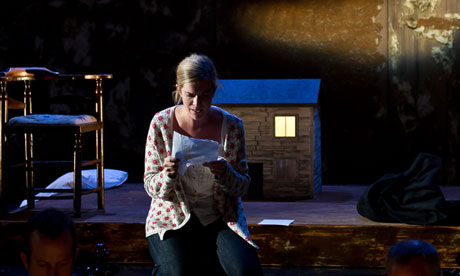
"Death is constant but love is a traitor." This truth acts as a dark motif for the double bill of opera premieres at the Traverse theatre, Edinburgh, part of a flurry of new works which close the 2012 festival and launch Scottish Opera's 50th-anniversary season in bracing style. Bravo to them. Elsewhere, understandably if drearily, you can barely move for revivals. (ENO's The Magic Flute, back this month for its last outing, has made more comebacks than Marlene Dietrich's legs.)
The words quoted above come from Ghost Patrol by Stuart MacRae (b 1976) and novelist Louise Welsh, but could equally apply to In the Locked Room by Huw Watkins (b 1976) and poet David Harsent. If at first glance these two co-commissions with Music Theatre Wales appear similar, each using small forces, each with a contemporary setting and circling around a love triangle which ends in death, the comparison should not be laboured.
Welsh-born Watkins and Scottish-born MacRae, who between them have studied with almost every top British composer, thus covering all stylistic eventualities, have refreshingly different musical personalities. In the Locked Room, an updating of a Thomas Hardy short story (An Imaginative Woman), takes place in a rented holiday cottage by the sea. Lonely Ella reads poetry while her high-finance husband Stephen talks into his smartphone. The houseowner, Susan, refers to a locked room, used by the poet whose work Ella is reading. A grand obsession leads to grave consequences.
Harsent's text, his second for Watkins, is spare and lucid. Having worked with composers over many years, notably Harrison Birtwistle (The Minotaur, Gawain), Harsent has honed a gift for brevity. He constructs dialogue of rhythmic immediacy, mostly using words with one syllable. "He comes and goes but the room is his" is characteristic. Watkins responds with lightly woven, clear textures, each instrumental colour audible, from the ominously pecking cello and solo woodwind at the start to the more sustained, inky colours when the locked room is first mentioned. The music gathers momentum but remains transparent to the delicate ending. Ruby Hughes, Håkan Vramsmo, Paul Curievici and Louise Winter were an excellent and credible cast.
In Ghost Patrol MacRae uses the same palette and an equally sparse and punchy libretto, but opts for close-knit musical argument and a constantly simmering orchestral style, using electronics, pre-recorded chorus and inventive aural effects: violins in eerie, double-stopped harmonics, the double bass creating percussive menace by bouncing the wood of his bow. You can hear Birtwistle's influence in the high woodwind laments, but more as homage than imitation.
The plot explores loyalty and betrayal via two ex-soldiers with a shared secret. A thief in the night, Sam (Nicholas Sharratt), breaks into a gastropub, only to be confronted by Alasdair (James McOran-Campbell) whom he recognises – as well you might, given his striking near nakedness – as his former commanding officer. Sam falls for Alasdair's girlfriend Vicki (Jane Harrington). The past catches up, fatefully. Her folk-like threnody about a girl mourning the loss of her menfolk shot dead by soldiers had powerful expression. The cast here, too, was strong.
Both works were conducted skilfully by Michael Rafferty. Directors Michael McCarthy (In the Locked Room) and Matthew Richardson (Ghost Patrol), and designers Samal Blak and Ace McCarron created nimble productions using modest resources. Players from the orchestra of Scottish Opera rose to the challenge of becoming fine solo instrumentalists in the small ensemble. Catch this thought-provoking double bill on tour to Glasgow, London and elsewhere from now until mid-November.
British composers have had a blazing week, all told. Two premieres by Errolyn Wallen, Principia and Spirit in Motion, caught the mood at the Paralympics opening ceremony, with help from Holst, Ian Dury, Beverley Knight and Handel. The Proms celebrated Alexander Goehr at 80 and Oliver Knussen at 60. Howells's Hymnus Paradisi was given an overdue Proms premiere – well, I say overdue; I would have held it back another century but many were in rapture. Britten's Peter Grimes, conducted by Edward Gardner and with Stuart Skelton in the title role, is being spoken of as a highlight of the season.
As I heard it to an accompaniment of satnav directives and traffic reports I am not, call me purist, best placed to review it, only to report its significance. With chance synchronicity I was driving towards Britten's own county – Suffolk – to hear music by the composer he revered. Bach's St John Passion was a focal point of this year's Suffolk Villages festival, now marking its 25th anniversary with a "Bach Day", but despite its longevity still a fairly well kept secret. "What concert?" asked the harassed waiter in the pub next door as the clock ticked towards the mighty "O Mensch!" lift-off.
Founded by Peter Holman, a pioneering early music man best known for his Parley of Instruments, the self-funded festival takes place every August bank holiday and specialises in baroque repertoire, nurturing student performers (among them the trumpeter Alison Balsom) and engaging top players. Holman, directing from the harpsichord, inspired a lithe and enjoyable performance of the St John Passion in German, using the 1725 version and its additional arias. If the soloists, led by tenor Daniel Auchincloss as the Evangelist, proved more streamlined than the chorus (women extremely good, men enthusiastic), this merely added a sense of authenticity which Bach might have recognised.
Earlier the same day, harpsichordist Steven Devine gave an intimate, honest account of the Goldberg Variations which grew in boldness as he progressed. After the harmonic fantasy of No 25 (adagio), he leapt up several gears for the last five variations, driven by motoric urgency, manic trills and virtuosic arpeggio figures. As Bach said, in words always worth repeating, all you need do is touch the right key at the right time and the instrument will play itself. As the final aria sounded, quiet and unadorned, you could see that Bach, as ever, had embodied mystical formula in practical advice.

